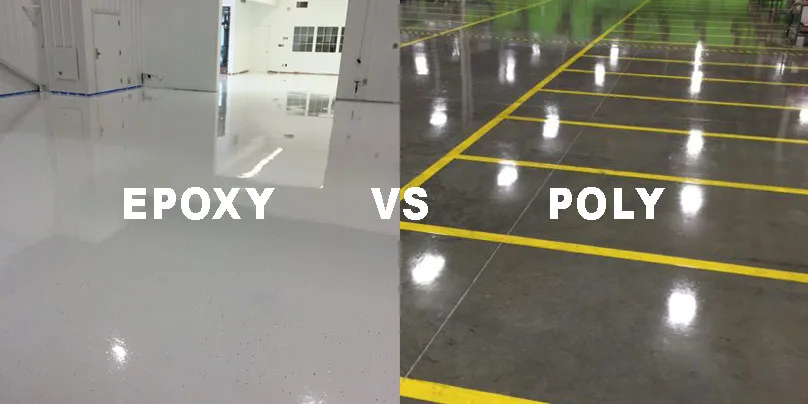The terms Polyurethane and Epoxy are used by many people. Polyurethane and Epoxy Coating has their own unique properties. Both coatings functions well, where there is physical impacts. It is challenging to find the best option for a given application as there is wide range of polyurethane and epoxy to choose from. Following are the difference between polyurethane coatings and epoxy coatings so that you can choose easily for your flooring.
Epoxy Coatings
A main advantage of epoxy coating is that they are surface tolerance. They can stick to all variety of surfaces. Depending upon surfaces, manufacturer can choose one from a wide range of epoxy. Each of these epoxy has their own distinct properties.
Epoxy coatings offer impressive amounts of durability and impact resistance. Some benefits of epoxy are :
- Long-lasting Durability and High Performance – Epoxy, renowned for its long-lasting durability and high performance, stands as a reliable in the field of versatile adhesives and coatings. Engineered with a robust molecular structure, epoxy create bonds that withstand the test of time, exhibiting exceptional resistance to wear, corrosion, and environmental elements.
- Ability to Bond – Epoxy’s remarkable ability to bond surpasses conventional adhesives, owing to its unique chemical composition. Comprising resin and hardener components, epoxy forms a potent adhesive when mixed, creating strong and enduring bonds on various surfaces, including metals, plastics, ceramics, and composites.
- Thick Build Coats – Epoxy coats can self-level, creating a smooth surfaces by filling cracks and other marks on the surfaces.
Polyurethane Coatings
As Epoxy flooring are hard and are impact resistance, polyurethane are soft and are scratch resistance as compared to epoxy. Polyurethane is ideal for flexible substrates. Polyurethane also helps concrete surface in preventing cracks. Some advantages of polyurethane coating are:
- Durability: Polyurethane coatings provide exceptional durability, resisting abrasion, impact, and wear over extended periods. This durability makes them ideal for high-traffic areas and surfaces subjected to harsh conditions.
- Chemical Resistance: Polyurethane coatings are not only resistant to chemicals but also resistance to acids, oils & solvents. This attribute makes them suitable for applications in industries where exposure to corrosive substances is common.
- Weather Resistance: These coatings are known for their excellent weather resistance, protecting surfaces from UV radiation, moisture, and temperature variations. This makes them suitable for outdoor applications, such as building exteriors, automotive finishes, and marine coatings.
- Flexibility: Polyurethane coatings maintain flexibility even after curing, allowing them to withstand movements, expansions, and contractions in substrates without cracking or peeling. This flexibility is especially beneficial in applications where structural elements may experience slight movements.
- High Performance: Polyurethane coatings can offer high-performance characteristics, such as excellent adhesion, hardness, and scratch resistance. This makes them suitable for demanding applications in industries like automotive, aerospace, and electronics.
Polyurethane vs. Epoxy
Polyurethane coatings and epoxy coatings are both popular types of protective coatings used in various industries for different applications. Difference between Polyurethane and Epoxy are:
Chemical Composition:
- Polyurethane Coatings: Polyurethane coatings are derived from the reaction between polyols and isocyanates. This chemical reaction forms a durable and flexible material.
- Epoxy Coatings: Epoxy coatings result from the reaction between epoxide resins and a curing agent (hardener). The chemical reaction forms a rigid, strong, and durable material.
Flexibility:
- Polyurethane Coatings: Polyurethane coatings are more flexible compared to epoxy coatings. This flexibility allows them to withstand movement and impact better, making them suitable for applications where the substrate may undergo expansion or contraction.
- Epoxy Coatings: Epoxy coatings are rigid and may become brittle under certain conditions. They are less flexible than polyurethane coatings.
Adhesion:
- Polyurethane Coatings: Polyurethane coatings generally exhibit good adhesion to a variety of substrates, including metals, concrete, and plastics.
- Epoxy Coatings: Epoxy coatings also provide excellent adhesion, making them suitable for various surfaces, including concrete and metal.
Chemical Resistance:
- Polyurethane Coatings: Polyurethane are suitable for applications where chemical exposure is concerned as they are chemical resistant.
- Epoxy Coatings: Epoxy coatings are generally resistant to chemicals but may have limitations depending on the specific formulation. They are often used in environments where chemical resistance is critical.
UV Stability:
- Polyurethane Coatings: Polyurethane coatings are known for their excellent UV resistance, making them suitable for outdoor applications. They are less prone to yellowing or degradation when exposed to sunlight.
- Epoxy Coatings: Epoxy coatings may experience yellowing and degradation when exposed to prolonged UV radiation. They may require additional UV-resistant topcoats for outdoor applications.
Application Areas:
- Polyurethane Coatings: Commonly used in outdoor applications, such as automotive coatings, exterior building coatings, and marine applications.
- Epoxy Coatings: Widely used in industrial settings, flooring, concrete coatings, and as a primer for various substrates.
Industrial Epoxy Solutions From Jemkon Pvt Ltd
Jemkon is an ideal choice for durable and high performance epoxy solution.
For Epoxy Coating Solution and Service contact us at
Contact no – +91 89567 40753
Visit – www.jemkon.com

